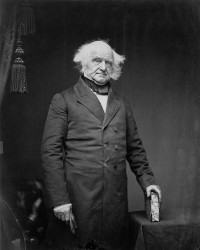
Martin Van Buren (5 December 1782 – 24 July 1862) was an American statesman who served as the eighth President of the United States from 1837 to 1841. A founder of the Democratic Party, he served as the ninth Governor of New York, the tenth Secretary of State, and the eighth Vice President. Van Buren won the 1836 presidential election based on the popularity of outgoing President Andrew Jackson and the organizational strength of the Democratic Party. He lost his 1840 re-election bid to Whig Party nominee William Henry Harrison due in part to the poor economic conditions of the Panic of 1837. Later in his life, Van Buren emerged as an important anti-slavery leader, and he led the Free Soil ticket in the 1848 presidential election.
Born
Articles
Historical examination of the evolution of the United States Civil Service and attempts to reform it, from its beginnings through the early 20th century
Revised version of the 1999 essay "Martin Van Buren: The Greatest American President", now a chapter in Reassessing the Presidency: The Rise of the Executive State and the Decline of Freedom (2001)
Discusses the Van Buren presidency and why he should be considered "the greatest president in American history", even when compared to other nonactivist presidents
The introductory paragraph uses material from the Wikipedia article "Martin Van Buren" as of 26 May 2018, which is released under the Creative Commons Attribution-Share-Alike License 3.0.
